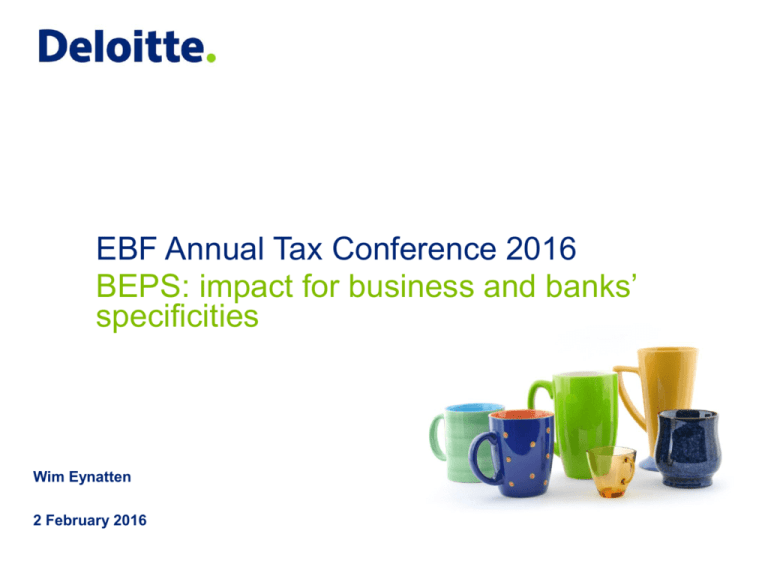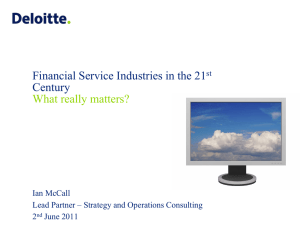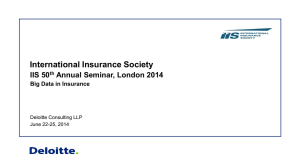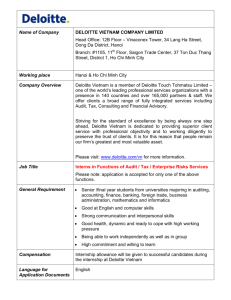07_Panel 2, Wim Eynatten
advertisement

EBF Annual Tax Conference 2016 BEPS: impact for business and banks’ specificities Wim Eynatten 2 February 2016 Practically BEPS is structured around 15 actions with three main impacts for MNEs BEPS Pillar Coherence Actions 1. Digital economy 2. Hybrids 3. CFC rules 4. Interest deductions 5. Harmful tax practices 6. Abuse of tax treaties 7. Permanent establishment 8 – 10 : Transfer Pricing Substance Transparency 3 main impacts Enlarged taxable basis • Interest • Taxable presence • Profit allocation Increased Compliance • TP documentation • Disclosure of tax information Uncertainty • GAAR • MAP? • Harmful tax practices? • Abuse of tax treaties? 11. Data collection on profit shifting 12. Disclosure of tax planning arrangements 13. TP Documentation 14. Arbitration 15. Multilateral Instrument 5 © 2015 Deloitte Touche Tohmatsu Potential BEPS impact for banks 15 Actions around 3 main pillars Coherence Substance Transparency and Certainty Preventing Tax Treaty Abuse (6) Hybrid Mismatch Arrangements Measuring BEPS (11) (2) Hybrid Mismatch Arrangements (2) Hybrid Mismatch Arrangements Avoidance of PE Status (7) (2) Hybrid Mismatch Arrangements CFC Rules (3) (2) Hybrid Mismatch Arrangements Disclosure Rules (12) (2) TP Aspects of Intangibles (8) Hybrid Mismatch Arrangements Interest Deductions (4) (2) Hybrid Mismatch Arrangements TP Documentation (13) (2) Hybrid Mismatch Arrangements TP/Risk and Capital (9) (2) Hybrid Mismatch Arrangements Dispute Resolution (14) (2) Harmful Tax Practices (5) Hybrid Mismatch Arrangements (2) TP/High Risk Transactions (10) Digital Economy (1) Multilateral Instruments (15) Taken from OECD live webcast “The BEPS Package” – 5 October 2015 2 © 2015 Deloitte Touche Tohmatsu Actions 2, 4 and 6 Key considerations I. Hybrid mismatches Interest deductions Preventing treaty abuse • The proposals will require changes toII.domestic legislation and are likely to take effect from 2017 or later. • Specific rules for banks and insurance companies are still awaited with final proposals to be released in 2016. • The general proposed LOB rules broadly prevent treaty relief from applying unless an entity can show that its ultimate beneficial owner is entitled to equivalent treaty relief. • There is no exclusion for securitisation issuers or SPVs. • Creates pressures for fund entities – some relief measures for CIVs. • There is no grandfathering of existing arrangements, so III. taxpayers will need to consider whether their arrangements fall within the scope of the rules. • Jurisdictions remain free to exclude hybrid regulatory capital from their hybrid mismatch rules / apply special rules, which could lead to increased complexity. • This leaves whole area of uncertainty around non-CIV, SPV’s, private funds, securitisation etc. • Implications for equity trading businesses. VI. 3 © 2015 Deloitte Touche Tohmatsu Action 7 - Permanent Establishments Two key changes: Updating the dependent agent definition • “habitually concludes contracts, or habitually plays the principal role leading to the conclusion of contracts that are routinely concluded without material modification by the enterprise and, these contracts are a) in the name of the enterprise, or b) for the transfer of ownership of […] property owned by that enterprise [… or] c) for the provision of services by that enterprise ” • Independent agent exemption will not apply where the agent acts “exclusively or almost exclusively” for closely related enterprises Tackling artificial avoidance of PE status through the specific activity exemptions • Are the activities ‘preparatory or auxiliary’ for the enterprise’s business as a whole? • Further guidance on the meaning of ‘preparatory or auxiliary’ © 2015 Deloitte Touche Tohmatsu Action 7 - Permanent Establishments Examples of activities potentially caught by the widening of the PE definition • Remote booking • Asset management – marketing and distribution services • Electronic platforms • Short term visitors • Private banking • Corporate banking • M&A advisory 5 © 2015 Deloitte Touche Tohmatsu Action 7 - Permanent Establishments Example 1: Remote booking model UK Booking entity Transaction booked onto BS of the UK US Hong Kong Sales team Trader employing • Contract concluding employing entity entity activities • Reliance on independent agent status Critical new words in Article 5(6) “… Where, however, a person acts exclusively or almost exclusively on behalf of one or more enterprises to which it is closely related, that person shall not be considered to be an independent agent” 6 © 2015 Deloitte Touche Tohmatsu Action 7 - Permanent Establishments Example 2: Short term visitor/Marketing and distribution Principal Contract concluded Country R Country S STV / M&D Third party customers Critical new words in Article 5(5) “or habitually concludes, or habitually plays the principal role leading to the conclusion of contracts that are routinely concluded without material modification by the enterprise” 7 © 2015 Deloitte Touche Tohmatsu Action 7 - Permanent Establishments Effect of recognising new PEs: • Different approaches to profit allocation in different jurisdictions • Increased compliance costs • Accounting consequences • Regulatory position could be affected • New tax reporting obligations • Other taxes: bank levy, indirect taxes, withholding taxes, exit taxes 8 © 2015 Deloitte Touche Tohmatsu What should banks consider? © 2015 Deloitte Touche Tohmatsu 4 key actions to be considered by banks • • • • Determine the data to gather and implement data collection process Analyse and check the data Back-test the results on the precedent fiscal years Anticipate the possible analyses of tax authorities and test the compliance of the TP policy with the economic substance of the Group Review the current tax positions • • • • • Use of hybrids Debt / interest policy Use of commissionaires / agents Booking models Short term business traveller programs Adjust tax strategy • Adjust tax strategy towards business strategy (more integrated vision and anticipation) • Align profits with value creation (tax optimisation = business optimisation) • Transform the tax teams, towards a more business oriented activity Prepare tax communication strategy • Define level of information to be disclosed • Define the communication packages by type of stakeholders (tax administrations, shareholders, public opinion…): annual report, specific tax report… • Brief and align the management (including business) I Prepare for the new reporting requirements II III IV 10 © 2015 Deloitte Touche Tohmatsu This presentation contains general information only and Deloitte is not, by means of this presentation, rendering accounting, business, financial, investment, legal, tax, or other professional advice or services. This presentation is not a substitute for such professional advice or services, nor should it be used as a basis for any decision or action that may affect your business. Before making any decision or taking any action that may affect your business, you should consult a qualified professional advisor. Deloitte shall not be responsible for any loss sustained by any person who relies on this presentation. 11 © 2015 Deloitte Touche Tohmatsu Deloitte refers to one or more of Deloitte Touche Tohmatsu Limited, a UK private company limited by guarantee, and its network of member firms, each of which is a legally separate and independent entity. Please see www.deloitte.nl/about for a detailed description of the legal structure of Deloitte Touche Tohmatsu Limited and its member firms. Deloitte provides audit, tax, consulting, and financial advisory services to public and private clients spanning multiple industries. With a globally connected network of member firms in more than 150 countries, Deloitte brings world-class capabilities and high-quality service to clients, delivering the insights they need to address their most complex business challenges. Deloitte has in the region of 200,000 professionals, all committed to becoming the standard of excellence. This communication contains general information only, and none of Deloitte Touche Tohmatsu Limited, its member firms, or their related entities (collectively, the “Deloitte Network”) is, by means of this publication, rendering professional advice or services. Before making any decision or taking any action that may affect your finances or your business, you should consult a qualified professional adviser. No entity in the Deloitte Network shall be responsible for any loss whatsoever sustained by any person who relies on this communication. © 2015 Deloitte Touche Tohmatsu







